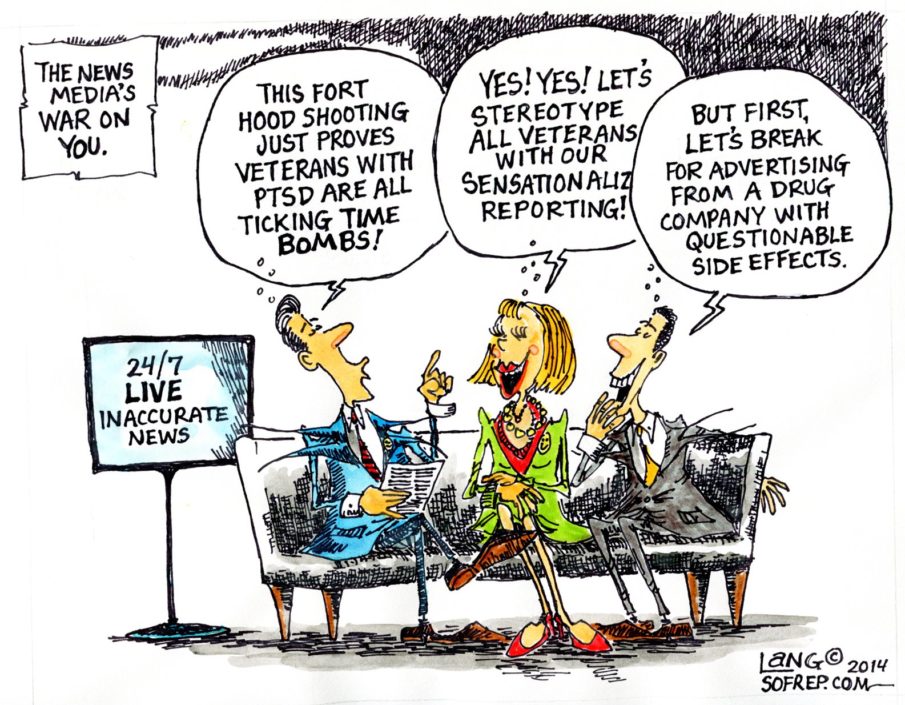“Can you talk to me about the active duty people who get diagnosed with PTSD and are automatically medically retired,” one associate producer at a major news network asked me during a pre TV interview last week.
PTSD (Post Traumatic Stress Disorder) is one of the most misunderstood subjects that the mainstream media reports on. What the press doesn’t realize is that their lack of understanding and subsequent reporting is falsely portraying veterans as damaged goods to American industry. Many veterans and active duty military I’ve spoken with recently are concerned about this, and want it to stop.
“It’s an open secret that my company’s HR department puts veterans’ resumes at the bottom of the pile,” one anonymous New York-based advertising executive told SOFREP.
The mental health stigma surrounding job-seeking veterans isn’t a new phenomenon. But given the much-publicized, strikingly high rates of post-traumatic stress disorder (PTSD) that afflict this generation of soldiers, it does threaten — quite unfairly — to markedly hamper their employment prospects. –From Forbes “Veterans Make Valuable Employees, So Why Aren’t More Getting Hired?”
It’s a problem that isn’t getting any better in the media, as proven by the recent Ft. Hood shooting coverage that is quick to shout PTSD, instead of realizing the difference between combat stress and a soldier with serious mental health problems.

Why Combat Veterans Are Good In Private Industry
Based on interviews with business leaders at 69 different companies, the report concludes that hiring veterans is actually one of the best moves an employer can make — and not because it offers good publicity or federal tax breaks (although, perhaps, those are added perks). Leaders interviewed for the report offered up 11 primary reasons to explain why veterans tend to stand out as ace employees. Many of those reasons are linked directly to a veteran’s experience during military service.
Veterans, according to business leaders interviewed for the report, offer versatility: They’re accustomed to uniform policies and structure, but can adapt to dynamic workplace situations. Vets tend to boast leadership and teamwork skills that outpace those of their civilian counterparts, and they’re often more loyal as well. “Veterans are committed to the organizations they work for,” the report notes, “which can translate into longer tenure.” –From Forbes “Veterans Make Valuable Employees, So Why Aren’t More Getting Hired?”
You don’t need a fancy Ph.D. or a six-figure government-sponsored study to arrive at the conclusion that combat veterans can be a valuable resource in private industry.
While every individual should be judged on his or her personal merit regardless of military experience, given a choice I’d hire a combat veteran over a college graduate any day. Don’t get me wrong. I value education, it’s an accomplishment, but some things can’t be learned in the classroom.
Combat Veterans Have Extremely Valuable Traits That Set Them Apart From Their Civilian Counterparts
- They know how to follow rules & orders
- Familiar with strategic planning & execution
- Experience taking calculated risks
- They are experienced self-motivators
- Vets have experience working in team environments
- They know how to make decisions under pressure
These are great traits to have in the management or senior leadership of any organization.
Jeanne Branthover, Director of the New York office for Boyden Global Executive Search, has been seeing a trend in her Fortune 500 clients to recruit top-level executives with military experience. They want people who can lead under difficult circumstances. –From Bestbusinesspractices.org “Why Veterans Make Great Small Business Leaders”
So how do we change the public perception about PTSD and veterans as damaged goods? For now, it’s up to successful civilians and veterans to get the word out via any available outlet, including social media. We need to better educate the public and the media in order to change the current narrative. We must make it widely known that veterans have a lot to offer their country beyond their service.
What can you do? You can start by sharing this article.
—–
This post is sponsored by The Steven and Alexandra Cohen Military Family Clinic at the NYU Langone Medical Center, who provide veteran and family mental health services in the New York area.
We work with Iraq and Afghanistan veterans, active duty service members, and their families who are affected by all phases of deployment and other life stressors.
We provide therapy for individuals, couples, families, children and adolescents, as well as parent consultation, group therapy, medication management and psychiatric evaluations.
We treat depression, anxiety, post traumatic stress disorder (PTSD), trauma and stress, alcohol and substance abuse, grief and loss, relationship and family conflict, military sexual trauma, readjustment problems, parenting concerns and children’s behavioral or academic problems.
All treatments are confidential.
For more information, call us at 855-698-4677.
This article previously published by SOFREP 04.07.2014 by Brandon Webb.










COMMENTS